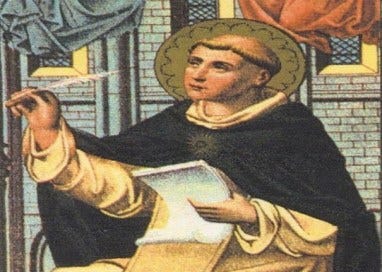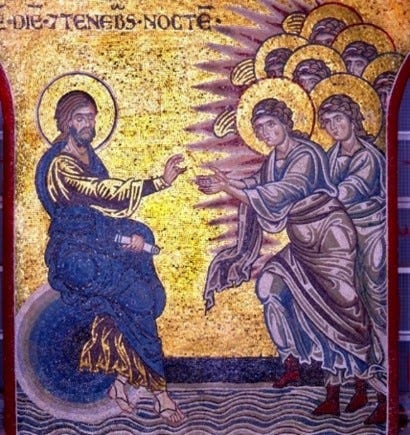Dear Friends of the Kolbe Center,
Glory to Jesus Christ!
In the movie “The Principle” leading experts in physics are interviewed who confirm that the empirical evidence indicates that the Earth is at or near the center of the material universe. One of the experts attempts to downplay the significance of this astonishing contradiction of the Copernican Principle by proposing that the material world is actually not a single universe but a multiverse and that it was more or less inevitable that a universe would evolve with a central earth like ours. If this sounds like a desperate attempt to avoid a straightforward interpretation of the evidence, it is—especially for a natural scientist who is supposed to stick to what is observed in nature and in the laboratory and not indulge in unreasonable speculation about imaginary worlds. Nevertheless, as Dr. Cletus Fuhrmann explains in his masterpiece Summa Contra Evolution, the multiverse argument is also used by so-called “Thomistic evolutionists” to argue for theistic evolution.
With reference to a Dominican theistic evolutionist, Dr. Fuhrmann writes:
The author makes use of the following quotation from St Thomas to say that he allows for the production of new species, since this would be the production of a better universe, and it is claimed St Thomas allows for this:
If [we look at the problem] with regard to the parts in themselves, then it can be understood that the universe can be made better, either through the addition of many parts, that is to say, so that many other species would be created, and that many degrees of goodness that can exist would be complete, since the distance between the highest creature and God is still infinite; and thus God could have made [in this way] the universe better and can still do it. St Thomas, Commentary on the Sentences, Book 1, Distinction 44.
In his reply to this argument in favor of theistic evolution, Dr. Fuhrmann quotes St Thomas who explains:
The goodness of anything is twofold; one, which is of the essence of it – thus, for instance, to be rational pertains to the essence of man. As regards this good, God cannot make a thing better than it is itself; although He can make another thing better than it; even as He cannot make the number four greater than it is; because if it were greater it would no longer be four, but another number….Absolutely speaking, however, God can make something else better than each thing made by Him. St Thomas, Summa Theologica, First Part, Question 25, Article 6.
Also:
The universe, the present creation being supposed, cannot be better, on account of the most beautiful order given to things by God; in which the good of the universe consists. For if any one thing were bettered, the proportion of order would be destroyed; as if one string were stretched more than it ought to be, the melody of the harp would be destroyed. Yet God could make other things, or add something to the present creation; and then there would be another and a better universe. St Thomas, Summa Theologica, First Part, Question 25, Article 6, Reply to Objection 3.
So, yes, God can create multiple worlds or universes. But as St Thomas shows, there are multiple reasons for rejecting this as being the case:
…it should be realized that some argue for the possibility of many worlds in other ways. In one way, as follows: the world was made by God; but the power of God, since it is infinite, is not limited to this world alone. Therefore it is not reasonable to say that He cannot make yet other worlds. To this it must be said that if God were to make other worlds, He would make them either like or unlike this world. If entirely alike, they would be in vain—and that conflicts with His wisdom. If unlike, none of them would comprehend in itself every nature of sensible body; consequently, no one of them would be perfect, but one perfect world would result from all of them.
Some argue in the following way: to the extent that something is more noble, to that extent is its species more powerful. But the world is nobler than any natural thing existing by itself. Therefore, since the species of a natural thing existing here, for example, of a horse or cow, could perfect many individuals, much more so can the species of the whole world perfect many individuals. But to this it must be answered that it takes more power to make one perfect than to make several imperfect. Now the single individuals of natural things which exist here are imperfect, because no one of them comprehends within itself the total of what pertains to the world’s species. But it is in this way that the world is perfect; hence, from that very fact its species is shown to be more powerful.
Thirdly, some object thus: it is better for the best to be multiplied than for things not so good. But the world is the best. Therefore, it is better to have many worlds than many animals or many plants. To this it must be said that here it pertains to the goodness of the world to be one, because oneness possesses the aspect of goodness. For we see that through being divided some things lose their proper goodness.” St. Thomas, Commentary on Aristotle’s On the Heavens, Book 1, Lecture 19.
Also, St Thomas argued that the angels must have been created with corporeal creatures to avoid a separate creation and thus another universe, which he thought was repugnant. In Questions on the Power of God, Question 3 Article 18, he writes:
[W]e must consider the angels not only absolutely, but also as a part of the universe, and there is all the more reason for doing so inasmuch as the good of the universe is of greater weight than the good of any individual creature, even as the good of the whole is of greater import than that of a part. Now, it became the angels, considered as part of the universe, to be created together with corporeal creatures. Because of one whole, there should seemingly be one making. And if the angels were created apart, they would seem utterly alienated from the order of corporeal creatures, and to constitute as it were another universe by themselves. Hence, we must conclude that the angels were created together with corporeal creatures…
The Angelic Doctor’s teaching on the creation of the angels with and not before the corporeal creatures was actually confirmed by the Fourth Lateran Council in 1215 in the Firmiter decree on creation against the Albigensian heretics. In his commentary on the Firmiter St. Thomas taught that the Firmiter defined that God created the spiritual and the corporeal creatures “simul” against the error of Origen and the Albigensians who taught that God only created the angels and some material elements and that the corporeal creatures—the different kinds of plants, animals, and human bodies—were the work of an evil principle who imprisoned them in bodies as a punishment for their sins.
Finally, the idea that God would evolve a “new world” that would be better than the one He created at first contradicts God’s promise to create a new world only at the end of time and not before:
After the last judgment has taken place, human nature will have reached its term. But, since all corporeal things were made for man, as we have shown, it will be fitting that the state of all corporeal creatures should be changed so as to be in conformity with the state of men as they will be then. And, seeing that men will then be incorruptible, all corporeal creatures will cease to be in the state of generation and corruption. This is indicated by the Apostle: The creation itself will be set free from its bondage to decay and obtain the glorious liberty of the children of God (Romans 8:21)…. Therefore, it is said: I saw a new heaven and a new earth (Revelation 21:1); and: I create new heavens and a new earth; and the former things shall not be remembered or come into the heart. But be glad and rejoice forever (Isaiah 65:17–18). St. Thomas, Summa Contra Gentiles, Book 4, Chapter 97.
Is it not remarkable how well the Angelic Doctor anticipated and refuted arguments that would be used, even by members of his own congregation, to deny man’s and earth’s centrality in God’s plan for creation! The more one contemplates the sophistical arguments used by Catholic scholars to defend theistic evolution, the more apparent it becomes that the whole concept of molecules-to-man evolution is a diabolical deception designed to deceive us into denying our divinely-ordained place in the universe. From the false and arrogant claims of Galileo and Descartes to the equally false and arrogant claims of Monsignor Lemaitre and Fr. George Coyne, the whole panoply of naturalistic explanations for the origin and structure of the universe flow from a willful refusal to take God at His Word about the order of creation, just as Satan deceived St. Adam into doing in the Garden of Eden.
On this, the eve of the anniversary of the Third Apparition of Our Lady of Fatima, let us ask Our Lady to obtain for us and all of our brothers and sisters in Christ the grace to be awakened from the naturalistic nightmare that has taken over the modern world. Through her prayers, may we be restored to sanity, and to a child-like faith that allows us to see the centrality of the Incarnation and the Immaculate Conception, the centrality of the earth, and the centrality of mankind in God’s plan for creation.
Yours in Christ through the Immaculata in union with St. Joseph,
Hugh Owen








Congratulations for your rigorous orthodox approach!